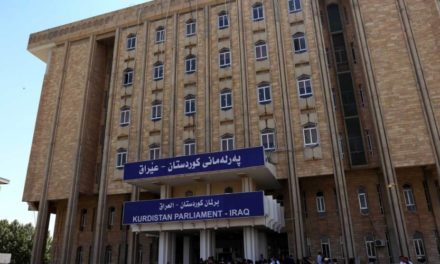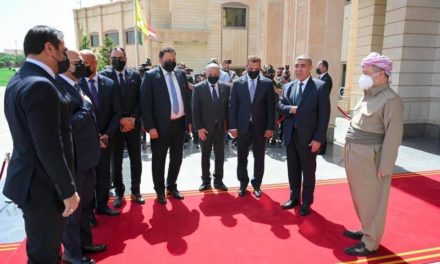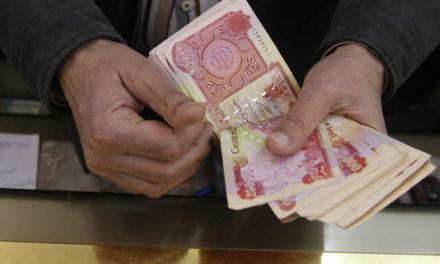Inter-governmental body the Financial Action Task Force (FATF) has removed Iraq from its list of states deemed weak in combating money laundering and terrorist financing, which experts believe should make international banks more comfortable doing business with the country. FATF, established in Paris in 1989 by the Group of 7 (G7), released a public statement on June 29 stating that Iraq had been removed from the list of “jurisdictions with strategic deficiencies” in their anti-money laundering and counter-financing of terrorism (AML/CFT) regimes.
The decision came after an on-site visit from a FATF team to determine whether Iraq was making sufficient progress with recommended reforms. Those reforms included (1) adequately criminalizing money laundering and terrorist financing; (2) establishing an adequate legal framework for identifying, tracing, and freezing terrorist assets; (3) establishing effective customer due diligence measures; (4) establishing a fully operational and effectively functioning Financial Intelligence Unit; (5) establishing adequate suspicious transaction reporting requirements; and (6) establishing an adequate AML/CFT supervisory and oversight program for the financial sector.
Freedom from the list should mean other countries and their financial institutions now find it easier to do business with Iraq. FATF calls on member and non-member states to enforce stronger due diligence and counter-measures when dealing with countries deemed high-risk. High-risk states are those on the strategic deficiencies list – also known as the “grey list” – and those on a more serious “black list”, reserved for countries with no action plan for addressing AML/CFT. Removal from the grey list should help with the process of getting international banks more comfortable with transacting with Iraq. However, it won’t remove the need for companies to undertake anti-corruption diligence on, and engage with, their business partners, or the need for the government to do more to simplify and automate the complex permitting processes that encourage corruption. Iraq spent almost five years on the grey list from October 2013 until it was removed from FATF’s monitoring process last week.
The country’s graduation to non-high risk comes just a day after the Governor of Iraqi Central Bank Ali Mohsen al-Alaq received the 2018 award for Best Central Bank Governor at the International Arab Banking Summit in Paris. The award recognized Alaq’s advancements in Iraq’s AML/CFT regime, in addition to stabilizing the exchange rate of the Iraqi dinar and increasing liquidity in Iraq’s financial market.
Last year the Central Bank of Iraq and the Iraqi Anti-Money Laundering and Countering the Financing of Terrorism Office, in partnership with the Danish Ministry of Foreign Affairs and its implementing partner, the Global Center on Cooperative Security, held workshops to discuss the implementation process of the Iraq National AML/CFT Strategy. The workshop focused on the practical objectives of developing concrete action plans for the implementation of the National AML/CFT Strategy and prepared Iraqi entities for FATF’s mutual evaluation. The program has helped Iraq draft laws and regulations and has helped train staff at Iraq’s AML/CFT Office. This activity is part of an ongoing program supported by Denmark to reinforce objectives and partnerships in the context of the Counter ISIL Finance Group (CIFG). The CIFG, which the United States, Italy, and Saudi Arabia co-chair, was established in January 2015 as one of the five working groups within the Global Coalition to Counter ISIS, a broad international group formed to degrade and ultimately defeat ISIS.
In October 2015, Iraq passed the Anti-Money Laundering and Counter-Terrorism Financing Law No. (39) of 2015 to replace the Coalition Provisional Authority (CPA) Order No. 93: Anti-Money Laundering Act of 2004. The new AML law improved on the 2004 framework and addressed FATF’s aforementioned recommendations, notably the establishment of an AML/CFT Office as the nation’s financial intelligence unit (FIU), a new committee empowered to freeze the funds and assets of individuals designated by UN sanctions, and enhanced customer due diligence (CDD) procedures.
In removing Iraq from the grey list, FATF has noted a “significant improvement” in the country’s AML/CFT framework and supporting laws and regulations. But there is no guarantee that Iraq will remain off the list and the country cannot afford to be complacent. Tasked with formulating the policies on anti-money laundering and combating financial support for terrorism, the Central Bank of Iraq continues to cooperate with international and regional organizations along with neighboring countries by exchanging information on financial intelligence relating to money laundering.
Disclaimer
Comments, opinions, and analyses are personal views and are intended to be for informational purposes and general interest only and should not be construed as individual investment advice or a recommendation or solicitation to buy, sell or hold any fund or security or to adopt any investment strategy. It does not constitute legal or tax or investment advice. The information provided in this material is compiled from sources that are believed to be reliable, but no guarantee is made of its correctness, is rendered as at publication date and may change without notice and it is not intended as a complete analysis of every material fact regarding Iraq, the region, market or investment.

Homam Zaini
Homam Zaini is a Senior Consultant at EY based in Washington, D.C. and a Certified Anti-Money Laundering Specialist (CAMS).










